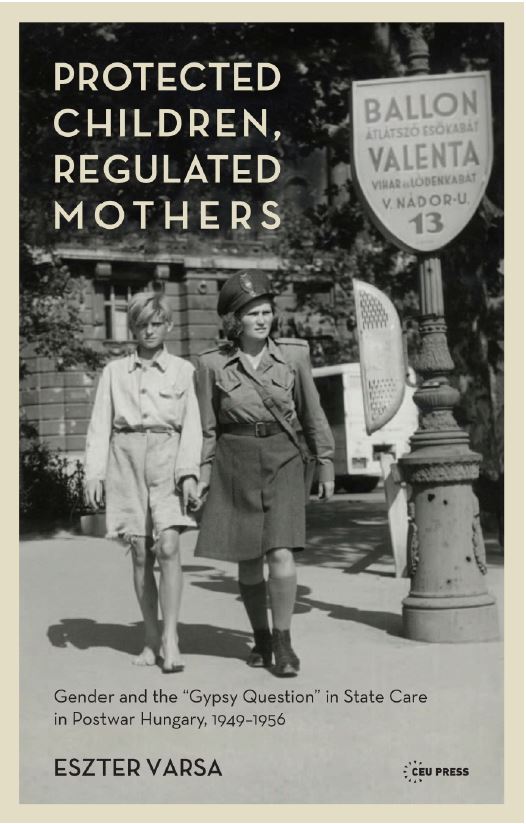Dr. Eszter Varsa
Zur Person
-
2011: Promotion (Ph.D.) in "Comparative Gender Studies" an der Central European University (Budapest)
-
2002: Masterabschluss im Fach Gender Studies an der Central European University (Budapest)
-
2000/2003: Masterabschluss im Fach Anglistik (mit Englisch als Fremdsprache) und Amerikanistik an der Eötvös Loránd Universität (Budapest)
-
1993: Abitur am Gymnasium der Evangelischen Kirche (Budapest)
-
1975: in Budapest (Ungarn) geboren
Stipendien und Auszeichnungen
-
2020: Romani Rose-Fellow an der Forschungsstelle Antiziganismus am Historischen Seminar, Universität Heidelberg.
-
Seit 2017: Fellow am IOS Regensburg.
-
2014-2016: Marie Sklodowska-Curie Intra-European Research Fellowship am Leibniz-Institut für Ost- und Südosteuropaforschung (Regensburg) (IOS)
-
2013-2014: DAAD-Stipendium am IOS (Regensburg) und am Goethe-Institut (Mannheim)
-
2006-2007: Forschungsstipendiatin als Promovierende an der University of Maryland, College Park, Fachbereich Geschichte
Beschäftigungen
-
Seit 2021: Wissenschaftliche Mitarbeiterin im ERC-Projekt ZARAH: Women's Labour Activism in Eastern Europe and Transnationally, From the Age of Empires to the Late 20th Century, Central European University, Wien.
-
2013-2016: Wissenschaftliche Mitarbeiterin am IOS Regensburg
-
2012-2013: Gastdozentur an der CEU, Fachbereich Geschichte
-
2011-2012: Gastdozentur an der CEU, Fachbereich Gender Studies
Projekte
Laufendes Projekt (Forschungsstelle Antiziganismus)
Health, hygiene and "solutions" to the "Gypsy question" in interwar Germany, Austria and Hungary (1918-1938)
The planned project examines the history of Roma and Sinti through the lens of medicine. It compares the construction of the category of "Gypsy" between the dichotomy of health and disease in discussions and policies around the "(solution of) the Gypsy question" in three different but related post-World War I contexts: Germany, Austria and Hungary between 1918 and 1938. It examines in particular the use of and changes in medicalized language with reference to "Gypsy" populations and the introduction of restrictive policies motivated by public health concerns from the end of World War I to the rise of National Socialism and the persecution of "Gypsies" at the outbreak of World War II. Based on Paul Weindling (2000), who drew attention to the important parallel processes between the early 20th century discovery of lice as a as a vector of transmission for typhus and the identification of those who were seen to be "unproductive" as "human vectors of disease" to be eliminated from the "healthy body" of the nation, the project poses the question how efforts towards the eradication of diseases, the improvement of health and hygienic conditions in the framework of eugenic state building were linked to the persecution of Roma.
Abgeschlossene Projekte
-
2006-2010: Promotionsprojekt an der CEU (Budapest): "Gender, 'Race'/Ethnicity, Class and the Institution of Child Protection in Hungary, 1949–1956", [Link].
-
2014-2016: Marie Sklodowska-Curie Forschungsprojekt am IOS (Regensburg): "Gesundheit, Hygiene und Assimilation von Roma in Österreich und Ungarn aus intersektionaler Perspektive, 1956-1989", [Link].
Veröffentlichungen
Monographie
- Protecting Children, Regulating Mothers: Romani and non-Romani Children in Residential Homes in Early Socialist Hungary (1949-1956), CEU Press 2021.
Aufsätze in Zeitschriften (peer-reviewed)
-
"‘New eugenics,’ gender and sexuality: a globalperspective on reproductive politics and sexeducation in Cold War Europe", in: History of the Family, 25, 4/2020, 527-549 (with Dorottya Szikra). [Link]
-
"Sex advice East and West: Sex education and family planning in Cold War Austria and Hungary", in: History of the Family 25, 4/2020, 649-670 .
-
"'The (Final) Solution of the Gypsy-Question': Continuities in Discourses about Roma in Hungary, 1940s-1950s", in: Nationalities Papers 45, 1 (2017), S. 114-130.
-
"'The Minor Would Hinder the Mother in Finding Employment': Child Protection and Women's Paid Work in Early State Socialist Hungary", in: East European Politics and Societies 31, 4 (2017), S. 818-839.
-
"The State-of-the-Art in Women’s and Gender History in Hungary: Studies from and about the State Socialist Period", in: Aspasia 7 (2013), S. 174-183.
Aufsätze in Sammelbänden
-
"'Gypsies'/Roma, and the Politics of Reproduction in Post-Stalinist Central-Eastern Europe", in: Katalin Fábián/Janet Elise Johnson/Mara Lazda (Hg.): The Routledge International Handbook to Gender in Central-Eastern Europe and Eurasia, New York (erscheint 2021).
-
"'The Gypsy Population Is Constantly Growing': Roma and the Politics of Reproduction in Cold War Hungary", in: Heike Karge/Friederike Kind-Kovacs/Sara Bernasconi (Hg.): From the Midwife's Bag to the Patient's File: Public Health in Eastern Europe, Budapest/New York 2017, S. 263-292.
-
"'Respect girls as future mothers': Sex Education as Family Life Education in State Socialist Hungary, 1950s-1980s", in: Ann-Katrin Gembries/Theresia Theuke/Isabel Heinemann (Hg.): Children by Choice? Changing Values, Reproduction, and Family Planning in the 20th Century, München 2017, S. 77-98.
-
"Roma", in: Holm Sundhaussen und Konrad Clewing (Hg.): Lexikon zur Geschichte Südosteuropa (2. Auflage), Wien [et al.] 2015, S. 787-791 (gemeinsam mit Karin Reemtsma).
Vorträge (Auswahl)
-
04/2018: Sex Advice East and West: Sex Education and Family Planning in Cold War Austria and Hungary, ESSHC 2018, Queens University Belfast.
-
09/2017: Child Protection Authorities' Perception of Romani and non-Romani Families in Early State Socialist Hungary, Tracing the Legacies of the Roma Genocide: Families as Transmitters of Experience and Memory, Villa Lana Prag.
-
07/2017: "Also Gypsy Women are Trying to Find Employment". A Source from Child Protection Work in Early State Socialist Hungary, Introductory Workshop: Concepts, Methods, and Evidence, AHRC Research Network on Legacies of the Roma Genocide in Europe since 1945, University of Liverpool.
-
02/2017: "Gypsies as objects of health education": Discourses on Roma in Hungarian medical journals, 1960s-1980s, European Healthcare Before Welfare States Workshop, University of Huddersfield.
-
12/2016: "Local Physicians and the Fight against Infectious Diseases in Austria and Hungary, 1918-1938", Universität Salzburg.
-
04/2016: "Preparation for family life": Sex education and pronatalism in Cold War Hungary, Making Children? 20th century Value Changes in Human Reproduction and Family Planning, Johannes Gutenberg-Universität Mainz.
-
11/2015: "The size of the Gypsy population is in a constant growth": Roma and the politics of reproduction in (North-East) Hungary, 1950s-1980s, ASEEES Annual Convention Philadelphia.
Mitgliedschaften
-
Board-Mitglied Prague Forum for Romani Histories, [Link] www.romanihistories.usd.cas.cz/
-
Association for the Study of Nationalities (ASN)
-
Association for Slavic, East European and Eurasian Studies (ASEEES)
-
Netzwerk für historische Studien im Bereich Gender und Soziale Arbeit (Network for Historical Studies of Gender and Social Work)
-
István Hajnal Stiftung für Sozialgeschichte in Ungarn




